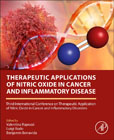
Therapeutic Applications of Nitric Oxide in Cancer and Inflammatory Disease: Third International Conference on Therapeutic Application of Nitric Oxide in Cancer and Inflammatory Disorders
Rapozzi, Valentina
Xodo, Luigi
Bonavida, Benjamin
Therapeutic Applications of Nitric Oxide in Cancer and Inflammatory Diseases presents updated information on the chemistry, signaling of newly derived therapeutic nitric oxide donors/inhibitors, and their complexes in liposomes or nanospheres in both pre-clinical and clinical investigations. The book consists of the following: The program and abstracts presented at the Third International Conference in Udine, Italy, September 3-5, 2023; Parts I-V reviews on (I) the general properties of nitric oxide in diseases (II) the role of nitric oxide in cancer (III) nitric oxide and immunity (IV) nitric oxide and aging and (V) nitric oxide and therapeutics. In addition, part VI is an educational review on artificial intelligence and its application in diseases. These updated reviews present many examples of research investigations related to the application of novel therapeutic compounds on nitric oxide and new derivatives, as well as their significant therapeutic activities against various resistant cancers that are unresponsive to current treatments and in different inflammatory diseases. The book is a valuable resource for cancer researchers, oncologists, graduate students, and investigators from medical and biomedical fields who want to learn more about NO and its therapeutic applications in cancer and inflammatory diseases. The book is also highly useful for both clinicians and oncologists as well as pharmaceutical companies involved in the development of new anticancer/anti-inflammatory agents. Provides updated reviews on the chemistry, signaling of newly derived therapeutic nitric oxide (NO) donors/inhibitors and their complexes in liposomes or nanospheres in both pre-clinical and clinical activitiesDiscusses the application of NO in monotherapy or in combination with conventional therapies in a variety of cancers and inflammatory diseasesEncompasses real-world examples of recent research related to NO and cancer so that readers can adapt them for their own use INDICE: Part I: General introduction 1. Pathogenic and therapeutic management of cardiac surgery-associated acute kidney injury: Role of nitric oxide biological pathways. Part II: Nitric oxide and cancer 2. The emerging role of dimethylarginine dimethylaminohydrolase 2 (DDAH2) in regulating vasculogenic mimicry in cancer Part III: Nitric oxide reactions in the cells and models to check its biological properties 3. Decoding S-nitrosylation: Theoretical aspects and analytical approaches 4. Preclinical Models to Assess the Pharmacological Properties of NO Derivatives Part IV: Nitric Oxide and neurodegeneration 5. NO-mediated neuroinflammatory pathways as treatment targets in neurodegeneration Part V: Nitric oxide and therapeutics 6. Role of Nitric oxide in Gemcitabine resistance in pancreatic cancer cells 7. Exploring the dual role of nitric oxide in glioblastoma: Therapeutic implications 8. Nitric oxide-donating systems and their potential in shaping tumor immunoregulation 9. Control of nitric oxide synthase 2: Role of NRF2-regulated distal enhancer 10. Nitric oxide in tumour biology: From stemness to metabolic reprogramming 11. Impact of nitric oxide on hemeprotein maturation and its relevance to cancer and pulmonary diseases Part VI: Educational session 12. Using AI to discover new cancer therapies: “Artificial intelligence (AI), the ability of machines to learn from new input, is a broad term for a range of computing methods”. AI is changing drug discovery
- ISBN: 978-0-443-22354-9
- Editorial: Academic Press
- Encuadernacion: Rústica
- Páginas: 300
- Fecha Publicación: 22/11/2024
- Nº Volúmenes: 1
- Idioma: Inglés
